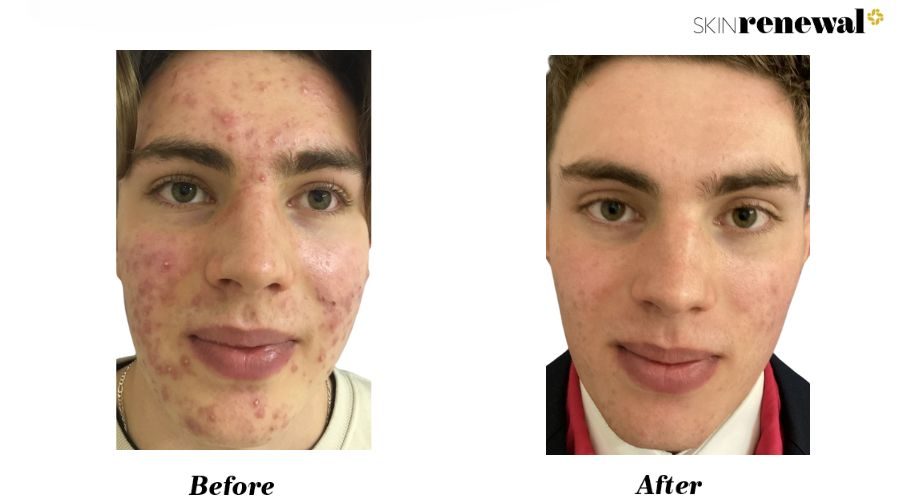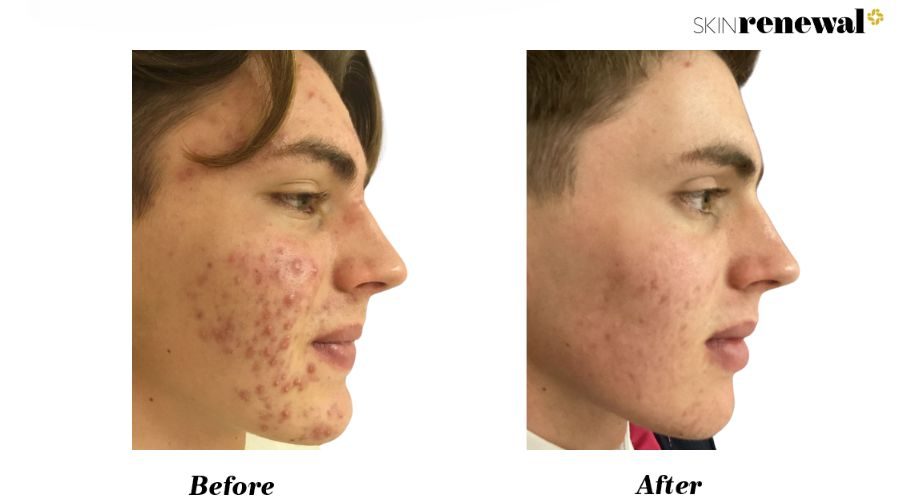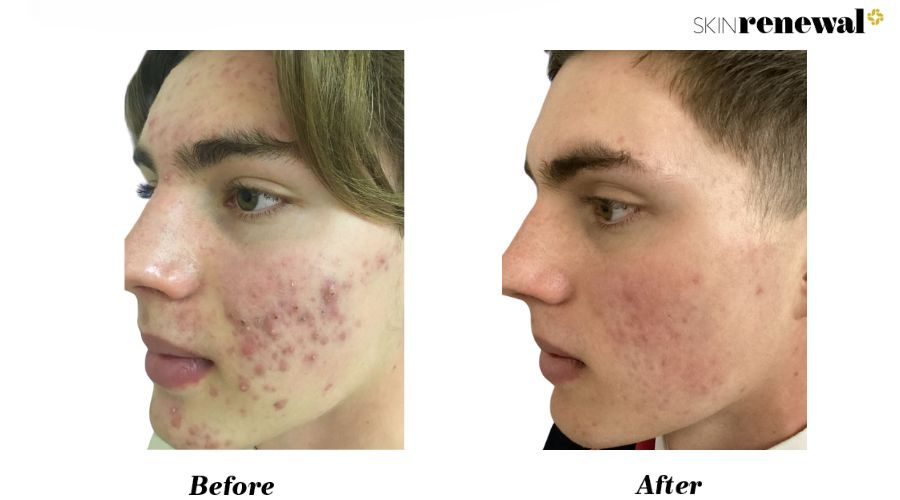Diagnostically, a Skin Renewal medical doctor can help and work with you to calm the source of the problem. In other words, your pimples are skin signals telling you something is off-balance in your body. The deeper you dive into what’s happening holistically, the better you can manage your acne.
Acne is essentially when hair follicles become clogged with oil (sebum), dead skin cells, and bacteria. You see blackheads, whiteheads, pimples, or cysts showing up on your face and chest, and often, for men, the back and shoulder areas. Remember, your genetics, diet, and the environment, like pollution, influence acne. Even your lifestyle choices (smoking, incorrect skincare and hydration levels) can impact the issue.
What Causes Acne?
Acne occurs when hair follicles become blocked with oil (sebum), dead skin cells, and bacteria. Several factors contribute to this process.
- Hormones: Hormonal surges during puberty, menstruation, PCOS or pregnancy increase oil production, clogging pores.
- Genetics: A family history of acne can predispose you to breakouts.
- Diet: High-glycaemic, processed foods and dairy can worsen acne by triggering inflammation and oil build-up.
- Environment: Pollution, humidity, and pore-clogging products can irritate the skin and lead to flare-ups.
How PCOS Contributes to Acne
Polycystic Ovary Syndrome (PCOS) is a hormonal disorder that affects multiple systems in the body—and the skin is no exception. Acne is a common symptom of PCOS due to the complex interplay of hormones, insulin resistance, and inflammation. Here’s how PCOS can trigger or worsen breakouts:
- Elevated Androgens (Testosterone):
Women with PCOS often have higher levels of androgens (male hormones), which stimulate excess sebum (oil) production. This leads to clogged pores, bacterial overgrowth, and inflammatory acne—especially on the lower face, jawline, chest, and back. - Insulin Resistance:
PCOS is strongly linked to insulin resistance, which increases insulin levels in the body. High insulin further stimulates androgen production, creating a vicious cycle that drives oil production and breakouts. - Chronic Low-Grade Inflammation:
Systemic inflammation, commonly seen in PCOS, contributes to skin inflammation and acne flare-ups. It also makes breakouts more persistent and resistant to standard acne treatments. - Hormonal Imbalance:
Fluctuations in oestrogen and progesterone levels, common in PCOS, can disrupt the skin’s natural healing process and make acne worse during specific phases of the menstrual cycle. - Nutrient Deficiencies:
Women with PCOS often experience deficiencies in essential skin-supporting nutrients such as Zinc, Vitamin D, and Omega-3 Fatty Acids, which help modulate immune responses and reduce inflammation. - Stress and Cortisol Dysregulation:
PCOS can affect adrenal function, leading to elevated cortisol (stress hormone) levels, which may worsen acne by increasing inflammation and oil production.
Symptoms of Hormonal Acne Linked to PCOS
- Deep, painful cysts around the jawline, chin, and lower face.
- Breakouts that coincide with menstrual cycles or periods of stress.
Treatment Options for Acne
Acne treatment isn’t a one-size-fits-all solution. Melanin-rich skins may tackle PIH and dark marks after the breakout (the skin injury). So treatment should be done for your specific needs and to heal the acne and what it’s left behind. Think of it as an overall approach. So, while a superficial chemical peel (like an Azelaic Peel) helps exfoliate dead skin cells and unclog pores, those with actual scarring and needing collagen stimulation may need the support of laser treatment.
Our doctor-led combination treatments target all layers of the skin for more effective and lasting results, helping you achieve clearer skin and long-term confidence. Treatment options include:
- Chemical Peels: Improve acne by exfoliating dead skin cells, unclogging pores, reducing excess oil, and diminishing acne scars and pigmentation for a clearer, smoother complexion.
- Limelight™: Reduces redness and pigmentation caused by acne.
- Laser Genesis: Stimulates collagen production, reducing the appearance of acne scars.
- Carboxytherapy: Enhances circulation to support the healing process.
- PDT with Red and Blue Light: Blue light destroys acne-causing bacteria, while red light reduces inflammation.
- Contact Yag: Targets deep acne lesions and scars for long-lasting results.
- Pico Toning: A non-invasive laser treatment that targets acne-causing bacteria, reduces inflammation, improves acne scars, fades pigmentation, and enhances overall skin texture.
Complete Acne Care
Understanding acne as a multi-faceted condition is essential for long-term control. Skin Renewal takes a holistic approach to acne management, addressing gut health, hormonal imbalances, and nutritional deficiencies:
- Topical Treatments: Retinoids, Salicylic Acid, and Azelaic Acid unclog pores, reduce lesions, and prevent future breakouts.
- Nutritional Support: Vitamins A, E, zinc, and omega-3 help reduce inflammation and strengthen the skin barrier. Also, refer to Skin Renewal's Acne Aid 2 in 1. It provides natural support in managing the common causes of acne.
- Holistic Solutions: We offer tailored therapies, including IV infusions, to address gut health, hormone imbalances, and nutrient deficiencies.
Skin Renewal's personalised approach means no more one-size-fits-all solutions. Let us help you find the right combination of treatments to achieve your best skin yet. Book your consultation today.




